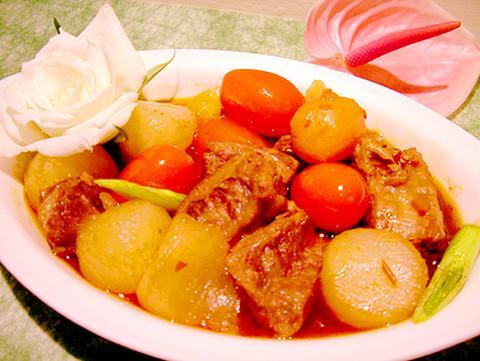Want a guaranteed good-tasting meal and attentive service when you dine out? Here's a tip: Try calling ahead and telling the owner you're a journalist interested in reviewing their restaurant. I tried as much on a recent visit to Corner, a new eatery opened in an alley off of Fuhsing North Road and Minsheng East Road, and to amazing effect. I was greeted at the door by name, regaled with friendly conversation and treated to a delicious meal. No more surreptitiously photographing meals that may or may not be worth the price tag (no more eating meals with price tags, for that matter), I'm calling ahead.
In business less than a month, Corner seems to have already ironed out many of the wrinkles experienced by most new restaurants. But Corner is more than a restaurant; it's also a florist shop and flowers dominate every aspect of the place, from what you see to what you eat. Part-owner Chen Shu-hsuen (

PHOTO COURTESY OF CORNER
But local businesses aren't the only ones taken by Corner. The same night I had my meal, Chen was busy talking with producers from Formosa Television (民視電台), who plan to air three segments of a popular weekend dining program at the eatery, introducing it as a florist boutique, cafe and restaurant. They seemed as pleased with their meals as I was with mine. "It's been really exciting, all that's been happening in the past month," Chen said, "But I'm very tired."
Thus far it doesn't show. In fact, Chen's energy seems as vibrant as the floral arrangements filling the space. His motivation, he says, is finding new ways of doing things that will interest his clients. "Our food isn't Italian or French -- it's no style in particular," he said. "We rather find interesting combinations of flavors that you might not have had elsewhere."
Breaded baked cod on a bed of onions covered with a thin layer of cheese is a tasty example. Despite the many heavy flavors involved, the succulence of the fish is what stands out most. It shares a plate with super-spicy Italian sausage, steamed vegetables and a lightly pickled okra. For desert, lavender-flavored gelatin topped with kiwi looked great, but I think I'd have preferred kiwi-flavored gelatin topped with lavender. You can't have everything, but tell them you're from a newspaper or TV station and you'll certainly get a lot.

June 2 to June 8 Taiwan’s woodcutters believe that if they see even one speck of red in their cooked rice, no matter how small, an accident is going to happen. Peng Chin-tian (彭錦田) swears that this has proven to be true at every stop during his decades-long career in the logging industry. Along with mining, timber harvesting was once considered the most dangerous profession in Taiwan. Not only were mishaps common during all stages of processing, it was difficult to transport the injured to get medical treatment. Many died during the arduous journey. Peng recounts some of his accidents in

“Why does Taiwan identity decline?”a group of researchers lead by University of Nevada political scientist Austin Wang (王宏恩) asked in a recent paper. After all, it is not difficult to explain the rise in Taiwanese identity after the early 1990s. But no model predicted its decline during the 2016-2018 period, they say. After testing various alternative explanations, Wang et al argue that the fall-off in Taiwanese identity during that period is related to voter hedging based on the performance of the Democratic Progressive Party (DPP). Since the DPP is perceived as the guardian of Taiwan identity, when it performs well,

A short walk beneath the dense Amazon canopy, the forest abruptly opens up. Fallen logs are rotting, the trees grow sparser and the temperature rises in places sunlight hits the ground. This is what 24 years of severe drought looks like in the world’s largest rainforest. But this patch of degraded forest, about the size of a soccer field, is a scientific experiment. Launched in 2000 by Brazilian and British scientists, Esecaflor — short for “Forest Drought Study Project” in Portuguese — set out to simulate a future in which the changing climate could deplete the Amazon of rainfall. It is

The Taiwan People’s Party (TPP) on May 18 held a rally in Taichung to mark the anniversary of President William Lai’s (賴清德) inauguration on May 20. The title of the rally could be loosely translated to “May 18 recall fraudulent goods” (518退貨ㄌㄨㄚˋ!). Unlike in English, where the terms are the same, “recall” (退貨) in this context refers to product recalls due to damaged, defective or fraudulent merchandise, not the political recalls (罷免) currently dominating the headlines. I attended the rally to determine if the impression was correct that the TPP under party Chairman Huang Kuo-Chang (黃國昌) had little of a